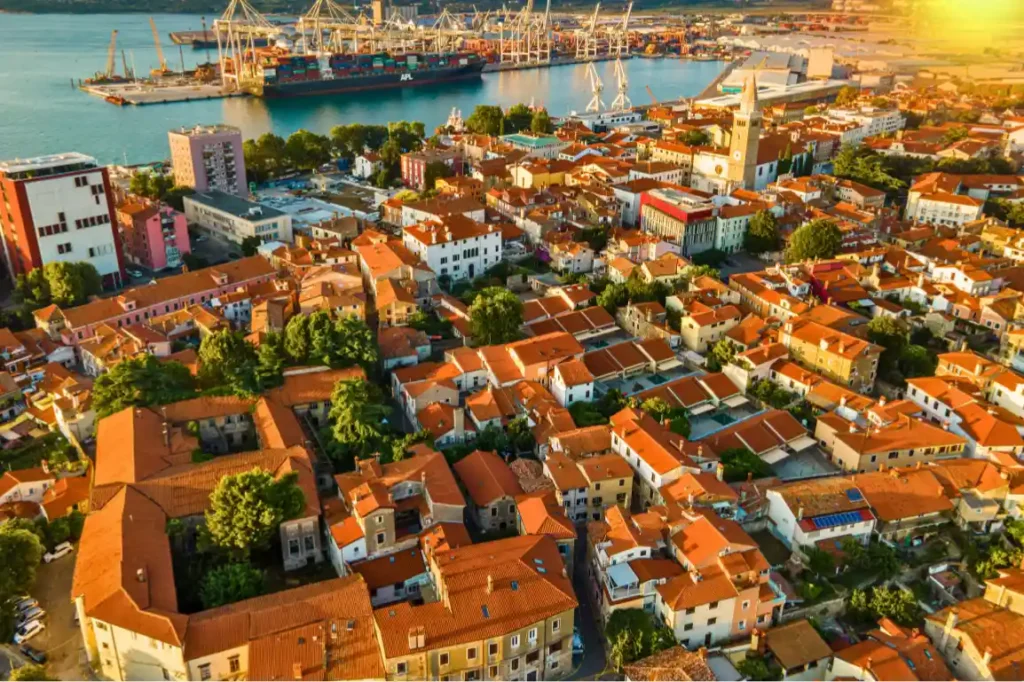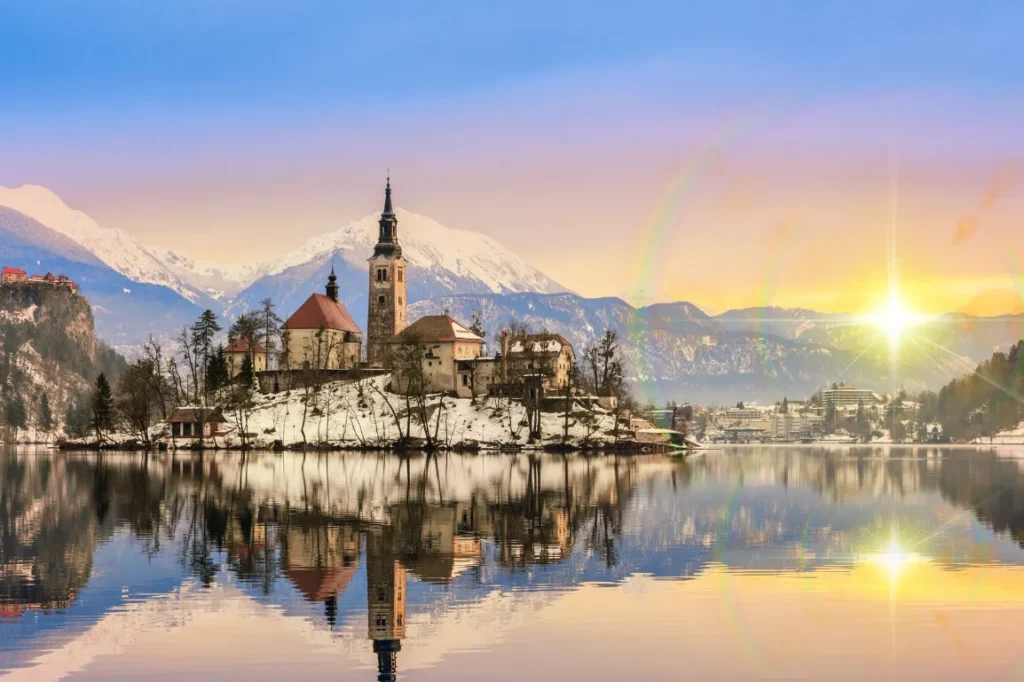Home > Slovenia Schengen Visas: Everything You Need to Know

Slovenia Schengen Visas: Everything You Need to Know
If you're planning a trip to Slovenia, there are probably a lot of things you're thinking about.
From where you're going to stay and what you're going to do, to the more administrative parts of the process like visas and entry requirements... there is some prep work involved in any trip abroad.
Slovenia is one of the most beautiful countries in Europe, and whether you're planning to explore as a tourist, live as a digital nomad, or conduct business, understanding the visa process is essential to making sure your trip is smooth and hassle-free.
In this guide, we're going to take a look at who needs a visa to go to Slovenia, visa types, how to apply, and more.

Do I need a visa to go to Slovenia?
Whether or not you need a visa to visit Slovenia depends on a few things:
- Your nationality (i.e., the country that issued your passport).
- How long you plan to stay in Slovenia.
- What you plan to do in Slovenia.
Slovenia is part of the Schengen zone which means that travelers from specific countries do not need a visa to visit. The key word here is some. Many travelers require a Schengen visa to visit.
If you’re not from a visa-exempt country (such as India, China, or South Africa), you will need a visa to travel to Slovenia, even for short trips. This visa (for trips under 90 days in length) is referred to as a Schengen visa.
If you are from a visa-exempt country (US, UK, Canada, and others) you do not need a visa to travel to Slovenia, so long as your trip doesn’t exceed 90 days and is primarily for tourism or business. If your trip is longer than 90 days or for a specific purpose, such as to work, you will need a visa.

Do US citizens need a visa for Slovenia?
If you're a US citizen, you do not need a visa for short visits, up to 90 days, within a 180-day period. This is because Slovenia is part of the Schengen Agreement (thus, the Schengen zone).
For longer trips, or if you're wanting to work in Slovenia (even remotely), you will have to apply for the appropriate visa for your situation, which we'll get to later in this guide.
How to apply for a visa for Slovenia
The process is pretty well-oiled machine, but it does require some preparation.
You’ll need to apply through a visa center or consulate in your country of residence, and the steps are as follows:
- Determine which Slovenian visa you need.
- Collect all of the necessary documents and ensure you meet the minimum requirements.
- Book an appointment at a visa center or consulate.
- Submit your visa application and biometrics.
- Receive an answer.

Can I apply for a Slovenia visa online?
Currently, no. You can't apply for a Schengen visa for Slovenia online. That said, you can start the process there by downloading the Schengen visa application form.
You will need to submit your application (with all of the required documents) in person at a visa application center or consulate. This is typically by appointment only.
Is a Slovenia visa difficult to get?
The application process, generally speaking, is pretty straightforward. Make sure to check that you meet all of the requirements and that you have the documents necessary.
That said, only the Slovenian Embassy can decide whether or not your visa application is approved or denied.
What is the rejection rate for Slovenia visas?
The rejection rate for Slovenia visas was 24.5% in 2024, globally.
It’s helpful to understand that rejection rates are fluid and they constantly change, sometimes even weekly. The rate is influenced by a variety of factors, such as seasonality, nationality, visa type, and more.
Because of this, the rejection rate percentage isn't really a relable indicator as to the likelihood that your application will be approved or denied.

Slovenia visa application requirements
Before applying, make sure that you meet all of the visa requirements. These can vary depending on which specific visa type you're applying for.
Which documents are required when applying for a Slovenia visa?
There are several "standard" documents that your application will require. Then, depending on visa specificities and your specific circumstance, you may be required to submit additional documentation.
- A valid passport.
- Visa application form.
- Recent passport-sized photos.
- Proof of Schengen travel insurance.
- Proof of accommodation.
- Flight itinerary.
- Biometric collection (fingerprints, which will be taken at your visa appointment).
- Financial proof (bank statements, sponsorship letter).
Your Slovenian visa appointment
An in-person appointment is required for Schengen visa applications. It'll take place at either a visa application center or a consulate and you will need to book this appointment in advance.
Appointment slots can (and do) book up very quickly, and sometimes are booked out for long periods of time. This is one of the reasons it's important to start the visa application process early.
At this appointment itself, an attendant will help you go through your documents to make sure your application is complete, meaning all of the requested documents (in the requested formats) are present. They will also guide you through the biometric submission process (collecting your fingerprints) if you haven't done it in the past 5 years.
You may be asked questions directly related to your documents or travel plans, but there isn’t a set list of questions you’ll need to prepare for.

Do I need to apply for ETIAS if I have a Slovenian visa?
No, ETIAS is not required for those who hold a valid Slovenia visa. ETIAS allows you to enter the Schengen area, which your visa already does.
Who needs an ETIAS to visit Slovenia?
From 2026 on, all travelers from visa-exempt countries, such as the US, UK, and Canada, will require ETIAS for short stays in Slovenia. You can learn more in our Slovenia ETIAS Guide.
FAQs: Schengen visas for Slovenia

The Hottest New Place for Digital Nomads? Slovenia
Remote-workers rejoice! Slovenia seems to be one of the most recent European countries to join the digital trend.
Several countries in Europe offer visas designed specifically for this unique type of traveler, and soon, Slovenia could be one of them.
Slovenia's digital nomad visa would allow its holders to live in Slovenia for up to a year while working remotely for their company from back home.
But how does it work? And who can apply? We have the details.
You must have a job that is outside of Slovenia
Move to Slovenia, get a job. While that is a dream for many, that isn't how the Digital Nomad visa would work.
In order to be eligible, you would have to have a work contract for a foreign company that is not registered in Slovenia and that does not serve Slovenia/the Slovenian people.
Your company must allow you to work in Slovenia
The company you work for must allow you to work remotely in Slovenia with this new Digital Nomad Visa. If your company has a "work anywhere" policy, this could be an interesting opportunity for you.
Some companies do not allow their remote employees to work outside of the country/countries they're registered in, so make sure to check this before deciding to apply.

Self-employed workers are eligible to apply
If you're self-employed, whether that's entrepreneurship or freelance, you could also be eligible to apply so long as, again, the work that you do doesn't serve Slovenian clients/audiences.
There is an income requirement
For applicants, an income requirement would exist. At this time, details aren't publicly available around how much applicants will need to prove they make in order to apply.
The amount will likely be calculated depending on the average cost of living in Slovenia.
For some context, we took a look at Numbeo's Cost of Living Calculator. According to it, Phoenix, Arizona's costs are 31.1% higher than Slovenia's capital, Ljubljana.
The visa would be valid for 12 months
Slovenia's new visa would allow its holders to stay in Slovenia for up to 12 months on a temporary residence permit.

How to apply for the Slovenia Digital Nomad Visa
Once available, visa-hopefuls will be able to apply for a Digital Nomad visa through a visa application center or consulate in their country of residence, should they meet the visa requirements.
The process can be started by checking the official Slovenian government's website and reviewing the requirements and steps, once the visa goes live.
Typically, to apply for a visa in a Schengen country, applicants must go through a series of steps:
- Determine which visa you'd like to apply for.
- Collect the required documents for your application.
- Book an in-person appointment at a consulate or visa application center.
- Attend your appointment and submit your biometrics.
- Receive an answer.

Because this is such a new visa, details are still emerging about what exactly the requirements will be, what rights its holders will have, and more.
We'll make sure to give you the details once they're made available to us.
